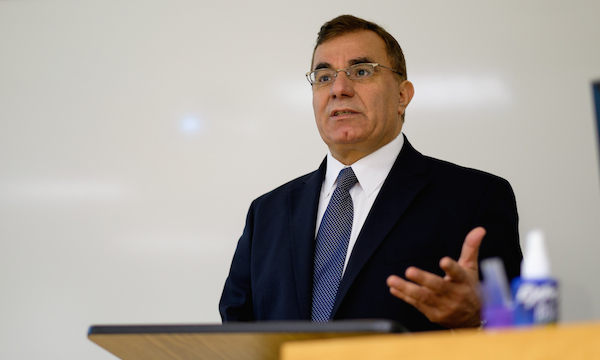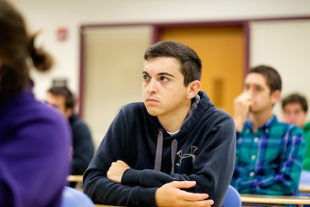Palestinian diplomat urges peace during return visit to campus
News
As a political science student at Madison College in the 1970s, Nabil Abuznaid (’79) endured a misunderstanding of, and at times angry rhetoric toward, his native Palestine. After all, the massacre of Israeli athletes by Palestinian extremists at the 1972 Olympic Games was still fresh in the minds of the American public, and newscasts from the Middle East regularly showed members of the Palestine Liberation Organization hijacking planes, exploding car bombs, and kidnapping and vilifying westerners.
“At that time, Palestinians were not known as they are today,” said Abuznaid, a diplomat who returned to JMU this week to give a public lecture on the Israeli-Palestinian conflict and to detail his involvement as a behind-the-scenes negotiator in the peace process. “We were seen as terrorists. Even 20 years ago, to be a Palestinian speaking at a college campus on behalf of Palestine was not acceptable. There would be protests. But today I see more sympathy from American students. They say, ‘how can we help Palestine, we think the situation is unfair, and we don’t support the occupation.’”

In essence, the long-standing conflict involves “two people claiming the same piece of land,” Abuznaid told students in associate professor of political science Dr. Bernd Kaussler’s special topics course Islam and Politics. Abuznaid’s parents were among the 750,000 Palestinians forced into exile following the creation of the Israeli state in 1948. Israel came to occupy the West Bank and the Gaza Strip during the Six-Day War in 1967 and has maintained control of the territories since. “All refugees still hope to go back to their homeland one day,” he said.
The path to peace, in which the U.S. has increasingly played a role, is full of roadblocks, he said, but there is room on both sides for compromise. “There is no issue in the world getting more attention in the media,” he told students. “Hopefully we can make a better understanding, and every one of you can help in the future to find a solution. Violence achieves nothing. The situation is very painful to everyone involved. Children of both nations should have the opportunity to live free.”
Abuznaid speaks fondly of his time at Madison and the career opportunities it afforded him, and he makes a point to visit campus and to speak with students when he’s in the Washington area.
“JMU and Harrisonburg were always so nice,” he said, adding that without the help of his professors in political science and people like Associate Vice President of Constituent Relations Steve Smith, who was working in admissions at the time and encouraged Abuznaid to apply, “I wouldn’t be where I’m at now.” In addition to his current role as head of the Palestinian Delegation to the Kingdom of the Netherlands, Abuznaid has held various teaching positions in Palestinian universities, participated in the peace talks in Annapolis in 2007, and organized and participated in several international conferences on Palestine.
“When I left James Madison, I didn’t really leave it, I took it with me,” he said. “It was my roadmap. … Even today, when I meet with high-level officials and they ask me, ‘Where did you get your education?’ I say, with respect to my other institutions, ‘JMU.’”
###

